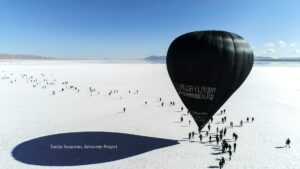Experiment and Experience: A Polyphonic Seminar on the Dao of Indeterminacy and Play

All sessions will be online at 17:00-19:00 pm (GMT / UK time)
Seminar Sessions
(Professor in the School of Arts, Media + Engineering; and Director Synthesis at Arizona State University) In the first seminar of the series, Sha describes a few modes of open-ended development from biology, sociotechnology, and time-based, movement-based art. Making use of select ideas from Laozi’s Daodejing, Zhungzi, daiost landscape, Deleuze, and process theory, Sha asks how we feel our way in such modes of sense-making and articulation.
(Reader in Critical Theory and founding Co-Director of the Centre for Philosophy and Critical Thought, Goldsmiths College, London)
(Affiliate, Synthesis Center @ ASU; Co-Founder, Fyrthyr Institute for Unsettling Technologies; Organizer, Center for Concrete and Abstract Machines) Western anthropologists studying the indigenous cultures of Black Africans on the continent have, all too often, been intent upon searching for “old ways” that have persisted in spite of the “modern” history of the continent, hoping to gain insights into “pre-modern” and “primitive” peoples. The reality is, however, that the cultural practices of indigenous Black Africans on the continent observed by these anthropologists have all been formed, to some degree, in response to one of the greatest sequences of geographic, demographic, and historiographic catastrophes, from the Slave Trade, to the Colonial Scramble for Africa, to the Organized Abandonment and Underdevelopment of the Postcolonies.
Similarly, Western anthropologists examining aspects of continental Black African cultures that seemingly persist in diasporic Black African cultures have, all too often, imagined that they are observing “old ways” that have persisted in spite of the genocidal, ethnocidal, and ecocidal machinations of racial capitalism. In reality, however, they are observing the dynamic play of homologous and analogous developments and recombinatory Trans-Atlantic crossings, back and forth, between the cultural ecologies of the continent and the diaspora — all being responses (and not simply reactions) to the apocalyptic events of the past six centuries on both sides of the Middle Passage.
Taking the above into consideration, this lecture will attempt to re-articulate the schism between the continent and the diaspora as an evolving object of philosophical study by re-appropriating and re-evaluating the psychoanalytic anthropologies and ethnographies that informed Deleuze and Guattari’s Schizoanalysis, re-reading them alongside the work of W.E.B. Du Bois, Franz Fanon, George Jackson, Hortense Spillers, Achille Mbembe, Saidiya Hartman, R.A. Judy, Fred Moten, and Denise Ferreira da Silva. In so doing, this lecture will make the case for an Anti-Oedipal Blackness and an Afro-Schizoanalytics that runs counter to applications of Western psychoanalytics and schizoanalytics to anthropologies of continental and diasporic Black Africans.
Founder and artistic director of SCILICET, a London-based studio exploring human & non-human collaboration.
(Research Director Emeritus at Centre national de la recherche scientifique at the Cavaillès interdisciplinary center of École Normale Supérieure in Paris)
Giuseppe Longo is CNRS Research director at Ecole Normale Supérieure, Paris and a former Professor of Mathematical Logic and of Computer Science, University of Pisa. He spent three years in the USA (Berkeley, MIT, Carnegie Mellon) as researcher and Visiting Professor. Longo is founder and director (1990-2015) of Mathematical Structures in Computer Science, a Cambridge U.P. journal. He co-authored about 140 papers and five books, between mathematics, computing and biology. In particular, with A. Soto and D. Noble, the volume From the century of the genome to the century of the organism: new theoretical approaches, a special issue of Prog Biophys Mol Biol, 122, 1, 2016, and Le cauchemar de Prométhée, les sciences et leurs limites, PUF, 2023.
Longo’s current project develops an “epistemology of the new interfaces” focusing on the historical correlations and on alternatives to the new alliance between computational formalisms and the governance of man and nature by algorithms and by supposedly objective “optimality methods”.